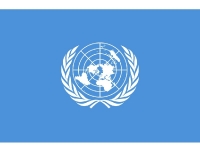Lifestyle
29 August is the International Day Against Nuclear Tests
To put end to all forms of nuclear tests

UNITED NATIONS
USPA NEWS -
Since nuclear weapons testing began in the mid-twentieth century, with the first test on 16 July 1945, nearly 2,000 have taken place. There has been little consideration of the devastating effects of testing on human life, let alone the understanding of nuclear fallout from atmospheric tests....
Since nuclear weapons testing began in the mid-twentieth century, with the first test on 16 July 1945, nearly 2,000 have taken place. There has been little consideration of the devastating effects of testing on human life, let alone the understanding of nuclear fallout from atmospheric tests. Early on, having nuclear weapons was a measure of scientific sophistication or military might. Hindsight and history have shown us the terrifying and tragic effects of nuclear weapons testing, especially when controlled conditions go awry, and in light of today´s nuclear weapons which are far more powerful and destructive.
Subsequent incidents world-wide have provided compelling reasons for the need to observe the International Day against Nuclear Tests - a day in which educational events, activities and messages aim to capture the world´s attention and underscore the need for a unified attempt in preventing further nuclear weapons testing.
The international instrument to put an end to all forms of nuclear testing is the 1996 Comprehensive Nuclear-Test-Ban Treaty (CTBT), which has however yet to enter into force.
The international instrument to put an end to all forms of nuclear testing is the 1996 Comprehensive Nuclear-Test-Ban Treaty (CTBT), which has however yet to enter into force.
On 2 December 2009, the 64th session of the United Nations General Assembly declared 29 August the International Day against Nuclear Tests by unanimously adopting resolution 64/35. The resolution calls for increasing awareness and education 'about the effects of nuclear weapon test explosions or any other nuclear explosions and the need for their cessation as one of the means of achieving the goal of a nuclear-weapon-free world.' The resolution was initiated by the Republic of Kazakhstan, together with a large number of sponsors and cosponsors with a view to commemorate the closure of the Semipalatinsk Nuclear Test site on 29 August 1991.
The Day is meant to galvanize the United Nations, Member States, intergovernmental and non-governmental organizations, academic institutions, youth networks and the media to inform, educate and advocate the necessity of banning nuclear weapon tests as a valuable step towards achieving a safer world.
2010 marked the inaugural commemoration of the International Day against Nuclear Tests. Each year, since then, the day has been observed by coordinating various activities throughout the world, such as symposia, conferences, exhibits, competitions, publications, instruction in academic institutions, media broadcasts and others.
2010 marked the inaugural commemoration of the International Day against Nuclear Tests. Each year, since then, the day has been observed by coordinating various activities throughout the world, such as symposia, conferences, exhibits, competitions, publications, instruction in academic institutions, media broadcasts and others.
Since its establishment, many bilateral and multilateral governmental level developments as well as broad movements in civil society and efforts of the UN Secretary-General himself have helped to advance the cause of banning nuclear tests.
Moreover, 'onvinced that nuclear disarmament and the total elimination of nuclear weapons are the only absolute guarantee against the use or threat of nuclear weapons,' the General Assembly designated 26 September as the 'International Day for the Total Elimination of Nuclear Weapons', which is devoted to furthering the objective of the total elimination of nuclear weapons, through the mobilization of international efforts.
Moreover, 'onvinced that nuclear disarmament and the total elimination of nuclear weapons are the only absolute guarantee against the use or threat of nuclear weapons,' the General Assembly designated 26 September as the 'International Day for the Total Elimination of Nuclear Weapons', which is devoted to furthering the objective of the total elimination of nuclear weapons, through the mobilization of international efforts.
First proposed in October 2013, resolution (A/RES/ 68/32) was a follow-up to the high-level meeting on nuclear disarmament held on 26 September 2013 in the UN General Assembly. The International Day for the Total Elimination of Nuclear Weapons was observed for the first time in September 2014.
UN Secretary-General Ban Ki-moon has stated with great clarity : 'A world free of nuclear weapons would be a global public good of the highest order.' Defining a ban on nuclear weapons as 'vital', in May of 2010, all the States Parties to the Treaty on the Non-proliferation of Nuclear Weapons, committed themselves to aim to 'achieve the peace and security of a world without nuclear weapons.'
UN Secretary-General Ban Ki-moon has stated with great clarity : 'A world free of nuclear weapons would be a global public good of the highest order.' Defining a ban on nuclear weapons as 'vital', in May of 2010, all the States Parties to the Treaty on the Non-proliferation of Nuclear Weapons, committed themselves to aim to 'achieve the peace and security of a world without nuclear weapons.'
The International Day against Nuclear Tests, together with other events and actions, has fostered a global environment with more optimistic prospects towards a world free of nuclear weapons. There have been visible signs of progress on various fronts but, equally, challenges remain. This was most apparent at the 2015 Review Conference on the Treaty of Non-Proliferation of Nuclear Weapons (NPT) held at the United Nations in New York from 27 April to 22 May, in which Parties to the Treaty failed to come to an agreement on the substantive part of the draft Final Document.
In a Statement to the Conference on Disarmament (CD) on 7 July 2015, Mr. Kim Won-soo, Acting High Representative for Disarmament Affairs, said, 'The failure of the NPT Review Conference to reach a consensus outcome“”and the frustration felt by States parties“”makes the imperative for the CD to break the two decade-long stalemate even more urgent.'
It is the hope of the UN that one day all nuclear weapons will be eliminated. Until then, there is a need to observe International Day against Nuclear Tests as we work towards promoting peace and security world-wide.
Source : United Nations
Ruby BIRD
http://www.portfolio.uspa24.com/
Yasmina BEDDOU
http://www.yasmina-beddou.uspa24.com/
It is the hope of the UN that one day all nuclear weapons will be eliminated. Until then, there is a need to observe International Day against Nuclear Tests as we work towards promoting peace and security world-wide.
Source : United Nations
Ruby BIRD
http://www.portfolio.uspa24.com/
Yasmina BEDDOU
http://www.yasmina-beddou.uspa24.com/
Ruby Bird Yasmina Beddou United Nations End All Forms Nuclear Testing 16 July 1945 Nuclear Weapons Powerful Destructive 1996 Comprehensive Nuclear Test Ban Treaty
Liability for this article lies with the author, who also holds the copyright. Editorial content from USPA may be quoted on other websites as long as the quote comprises no more than 5% of the entire text, is marked as such and the source is named (via hyperlink).






